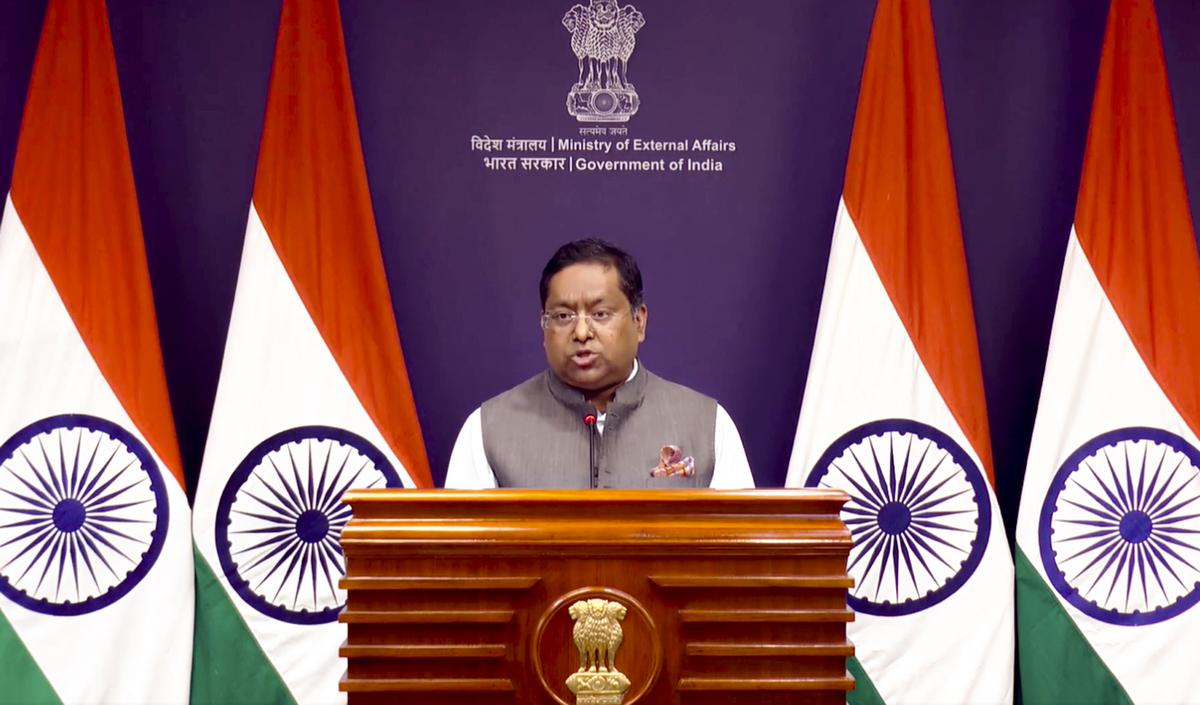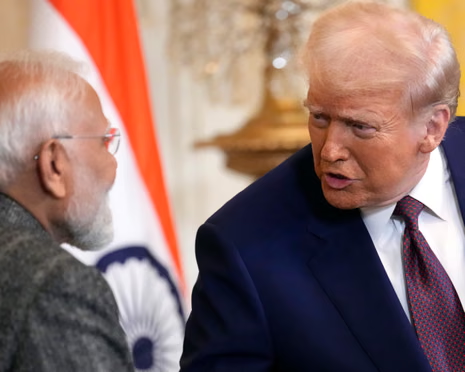New Delhi Dismisses Trump’s Statement on Russian Oil Pledge
India’s Ministry of External Affairs (MEA) has strongly denied U.S. President Donald Trump’s recent claim that Prime Minister Narendra Modi promised to halt Russian oil imports, calling the statement “unfounded and inaccurate.”
The clarification came after Trump, during a White House press briefing on Wednesday, asserted that Modi had assured him India would “no longer buy oil from Russia.” The remark, widely reported by international media, quickly drew attention amid ongoing global efforts to restrict Moscow’s energy revenues following its invasion of Ukraine.
MEA spokesperson Randhir Jaiswal rejected the claim on Thursday, stating: “I am not aware of any conversation yesterday between the two leaders.” He added that India’s stance on energy imports remains guided by national interest, not foreign political pressure.
Trump’s Statement Sparks Diplomatic Unease

Speaking to reporters, President Trump described the alleged pledge as “a big step toward isolating Russia,” claiming India’s cooperation would accelerate efforts to pressure Moscow economically. He suggested that the process of ending purchases would begin “soon,” but admitted the shift “could not happen immediately.”
However, India’s outright denial marks the second public rebuttal of Trump’s comments about private discussions with world leaders this year. In early 2025, Beijing also disputed Trump’s account of a similar exchange with Chinese President Xi Jinping.
The latest disagreement underscores growing friction between Washington and New Delhi over energy policy and trade amid heightened global scrutiny of Russian oil sales.
India Stresses Energy Sovereignty

In response to Trump’s claim, Indian officials reiterated the country’s independent energy policy and commitment to protecting domestic consumers from volatility in global markets.
“It has been our consistent priority to safeguard the interests of Indian consumers in a complex and unpredictable energy environment,” Jaiswal said. “Our import decisions are made with this principle in mind.”
India has consistently defended its right to source energy from the most affordable suppliers. Officials emphasize that New Delhi’s approach is non-political and pragmatic, aimed at ensuring national energy security while managing inflation.
Russian Oil Remains Key to India’s Energy Mix
Despite U.S. sanctions and Western pressure, Russia remains India’s largest oil supplier. Recent trade data indicates that Indian imports of Russian crude rose to 1.8 million barrels per day in October, compared to 1.6 million barrels in September.
Russian oil currently accounts for around one-third of India’s total crude imports, offering significant price discounts averaging $3.50–$5 per barrel compared to global benchmarks.
Industry executives told local media that refineries will continue purchasing Russian oil “as long as it aligns with India’s economic interests”, stressing that operations remain “business as usual.”
U.S.-India Tensions Over Trade and Energy
The diplomatic spat follows a series of trade-related frictions between the two countries. In August, President Trump imposed 50% tariffs on Indian exports, accusing New Delhi of undermining Western sanctions by purchasing Russian energy.
Washington has repeatedly urged India to reduce its dependence on Moscow and diversify imports, framing it as part of a broader campaign to curb Russia’s war financing. However, Indian policymakers argue that Western nations themselves continue to import Russian energy indirectly, particularly through refined products and intermediaries.
Economic analysts in New Delhi warn that bowing to U.S. demands could destabilize India’s fuel market, potentially leading to higher consumer prices and supply disruptions.
Balancing Strategic Partnerships
Experts say India’s balancing act reflects its multi-aligned foreign policy, seeking cooperation with both Western powers and traditional partners like Russia.
Dr. Meera Shankar, a former Indian ambassador, noted that “India’s relationship with Moscow has deep historical roots, especially in defense and energy. Any abrupt shift would harm strategic stability.”
She added that while India values its partnership with the United States, it “will not compromise national energy security under external pressure.”
Meanwhile, Washington’s recent trade measures have complicated bilateral ties. Analysts suggest Trump’s latest remarks could further strain trust between the two governments, especially ahead of the upcoming U.S.-India strategic dialogue.
Global Reactions and Market Implications
Following the exchange, oil market analysts said Trump’s statement briefly triggered volatility in Brent crude prices before stabilizing once India issued its denial.
International observers see the episode as part of a broader pattern of rising geopolitical tension between major energy consumers and producers. The confrontation also highlights the diplomatic tightrope India must walk as it balances Western expectations with its practical energy needs.
For now, India continues to navigate between economic necessity and diplomatic diplomacy, making it clear that decisions on Russian oil will be determined by national interest—not foreign declarations.

